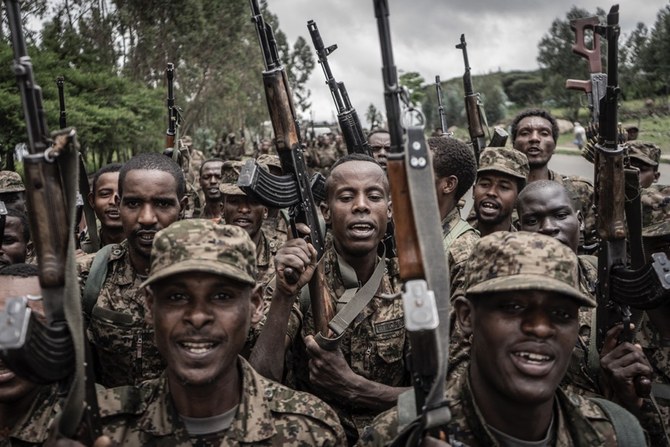DUBAI: A recent conflict trend analysis has confirmed that with each passing year the world has steadily grown more violent. The last three years in particular have emerged as the most tumultuous in three decades, painting a concerning picture of escalating global unrest.
Last year, there was an alarming surge in worldwide, state-based conflicts, hitting a high not seen since 1946. According to the Peace Research Institute Oslo’s “Conflict trends: A global overview,” 2023 alone saw an unprecedented 59 conflicts, marking it one of the most violent years since the end of the Second World War.
The report analyzes global conflict trends from 1946 to 2023, aiming to enhance policymakers’ understanding of their operational contexts.

Palestinian children run as they flee from Israeli bombardment in Rafah in the southern Gaza Strip. (AFP)
Siri Aas Rustad, research professor at the PRIO and lead writer of the report, said the findings indicate “the conflict landscape is becoming more complex,” with more actors involved in each country.
The report documented approximately 190 different state-based conflicts involving 95 countries since 1990.
The deadliest conflicts in recent memory highlighted by Rustad include the Tigray war in Ethiopia and the violence in Syria, with death tolls in each by most estimates exceeded 300,000.
Civil conflict in Afghanistan is thought to have caused more than 230,000 deaths, while the war between Russia and Ukraine is estimated to have claimed some 170,000 lives so far.
“When it comes to the longest conflicts, they are often not as deadly, with the two longest being the FARC insurgency in Colombia and the Israel-Palestine conflict,” she told Arab News.
While the civil war in Afghanistan spanned the past three decades, there were high fatalities during specific periods, including when American troops withdrew.

Ukrainian firefighters work amid the rubble of the Retroville shopping mall, a day after it was shelled by Russian forces. (AFP)
Nasr Arif, emeritus professor of political science at Cairo University and visiting professor at St Andrews University, describes the ongoing Palestinian conflict as among the deadliest in the past three years.
Nearly 40,000 people have been killed, 90,000 injured, and 15,000 are still missing and presumed dead, many buried under the wreckage of destroyed cities, according to Gaza’s health authorities.
“The ongoing conflict will set the whole region back to a pre-1977 situation, where societies in the Arab or Islamic world will reconsider peace deals with Israel,” he said.
Arif says that despite the willingness of several Arab states to normalize relations with Israel, the conduct of the Israeli army, as seen on social media, makes it impossible for governments to convince their societies otherwise.
“This will create a more hostile environment, and peace in the Middle East will require new approaches and leadership,” he said.
The only viable solution, according to Arif, is the establishment of a Palestinian state, without which the Middle East peace process will not survive.
INNUMBERS
• 59 Conflicts worldwide in 2023.
• 1.5m People killed in conflicts from 1990-2020.
• 190 Different state-based conflicts since 1990.
Source: Peace Research Institute Oslo
“Otherwise, the situation will resemble the post-Sept. 11, 2001, era, with the rise of extremist groups like Al-Qaeda and Daesh, leading to widespread individual acts of terrorism and retaliation,” said Arif.
Overall, he believes that identity politics and international intervention are to blame for the conflicts raging in Africa, Asia and Europe.
“These conflicts are often ignited and inflamed by international powers either from the same region or from a distance,” he told Arab News.
“Identity politics, whether ethnic, religious, or political, play a significant role, with international interventions supporting different parties, leading to higher casualties.”
Asif cites, as examples, NATO and the EU’s involvement in the Ukraine-Russia conflict, and meddling by outside powers in the affairs of Sudan, Iraq and Lebanon.

A tank of Eritrean army is abandoned along the road in Dansa, southwest of Mekele in Tigray region, Ethiopia. (AFP)
He blames foreign military support for Israel’s actions, in the face of accusations that its troops are not adhering to humanitarian or international laws, for the Gaza’s war’s high human toll.
Hamdy Abdel-Rahman Hassan, a professor of political science at Zayed University in Abu Dhabi, says the war in Gaza has intensified tensions in the Middle East, exacerbating regional instability.
“The conflict has led to widespread anger, with countries like Egypt and Jordan fearing a potential influx of Palestinian refugees,” he told Arab News.
Additionally, non-state actors in the Iran-led coalition known as the “Axis of Resistance” have expanded their attacks, targeting Israeli and American military positions and shipping lanes, prompting retaliatory strikes from Israel, the US and the UK, according to Hassan.
“This cycle of violence risks escalating into a broader conflict, which is why a ceasefire in Gaza (is) seen as crucial to mitigating the regional escalation.”
Even more worrying is the potential for the ongoing conflict to expand into a full-scale war and further destabilization, especially if it results in significant civilian casualties or more military confrontations, says Hassan.

Ukrainian rescuers hose down a destroyed residential building as they move rubble after a missile strike in Mykolaiv. (AFP)
As for the two-state solution widely cited as a possible antidote to conflicts in the Middle East, Hassan believes this may be further from reality than ever before.
On the other hand, Hassan attributes the increase in overall state conflicts to several interrelated factors, including advances in technology and unresolved regional tensions.
“Technological advancements have introduced new forms of warfare, such as cyberattacks and lethal autonomous weapons, making conflict resolution more complicated,” he said.
“Unresolved regional tensions and the breakdown of state institutions have fueled conflicts involving non-state actors, such as political militias and terrorist groups.”
Hassan also says that the increasingly evident effects of climate change are leading to more resource scarcity, thereby intensifying ongoing conflicts.
Examining the overall number of casualties between 2021 and 2023, the Uppsala Conflict Data Program documented around 600,000 battle deaths, a stark contrast to the preceding three years (2018-2020), which recorded approximately 180,000 deaths.

Fighters from a local armed pro-government group Gatia in the town of Menaka, Mali. (AFP)
“The three preceding decades (1990-2020) saw a total of 1.5 million killed,” said the PRIO’s Rustad, meaning more than 25 percent of all battle deaths reported in the past 33 years occurred between 2021 and 2023.
Despite these shocking numbers, Rustad pointed out that a high number of conflicts does not necessarily translate to a high level of battle deaths, as the majority of fatalities occur in just a few conflicts.
In fact, most of the 59 conflicts recorded are relatively small in scale, according to Rustad. “What we see is that while the number of conflicts is increasing, the number of conflict countries is going down,” she said.
Conflicts were recorded in 39 countries in 2022, dropping to 34 in 2023, indicating a concentration in fewer nations.
In fact, nearly half of the countries experiencing conflict in 2023 were engaged in more than one ongoing conflict, and seven countries were simultaneously involved in more than three.
“Taking this together with the high number of internationalized civil wars and the relatively high number of extreme violent conflicts, we see that the global conflict landscape is becoming more complex and difficult to maneuver for states as well as organizations such as the UN, World Bank, and EU,” Rustad said.
Zayed University’s Hassan says a spike in levels of organized crime and urban violence has highlighted the fragility of the rule of law in many regions.
“The strain on international cooperation has diminished the global capacity to prevent and resolve conflicts, contributing to the complexity and persistence of modern violence,” he said.
According to him, the war in Gaza is not without significant repercussions for the global system, challenging peace and security on multiple fronts.

A man rushes an injured child to hospital after an Israeli bombing in central Gaza Strip. (AFP)
“The strategic rivalry among major powers has created opportunities for regional and middle powers to assert themselves, rejecting the current international order,” said Hassan.
He points to North Korea, saying that it has taken advantage of the war in Ukraine to enhance its missile capabilities and strengthen ties with Russia, complicating global security dynamics.
Similarly, according to him, Iran has leveraged international instability to bolster its regional influence, supplying military support to Russia and challenging Western hegemony.
“These actions underscore the broader impact of regional conflicts on the international system, where weakened mechanisms for conflict resolution and diminished US dominance have emboldened actors to pursue their agendas aggressively, further destabilizing global peace and security,” Hassan said.
Echoing this sentiment, Cairo University’s Arif says the trend over the last three decades signifies the end of the unipolar international system, which was dominated by the US after the collapse of the Soviet Union between 1989 and 1992.

A Palestinian child pushes another child in a wheelbarrow between destroyed buildings in Khan Yunis, in the southern Gaza Strip. (AFP)
“The American-led world order has failed to bring peace, as evidenced by the ongoing conflicts,” he said, echoing a commonly held view across the Middle East.
“The disregard for international law and organizations, highlighted by the US use of veto power to protect Israel during ceasefire negotiations, signals a collapse of the current international system.”
Ultimately, Arif says, the situation calls for a rethinking of the international order and organizations, starting with the UN Security Council, so that a new system capable of effectively addressing global conflicts can be developed.




























